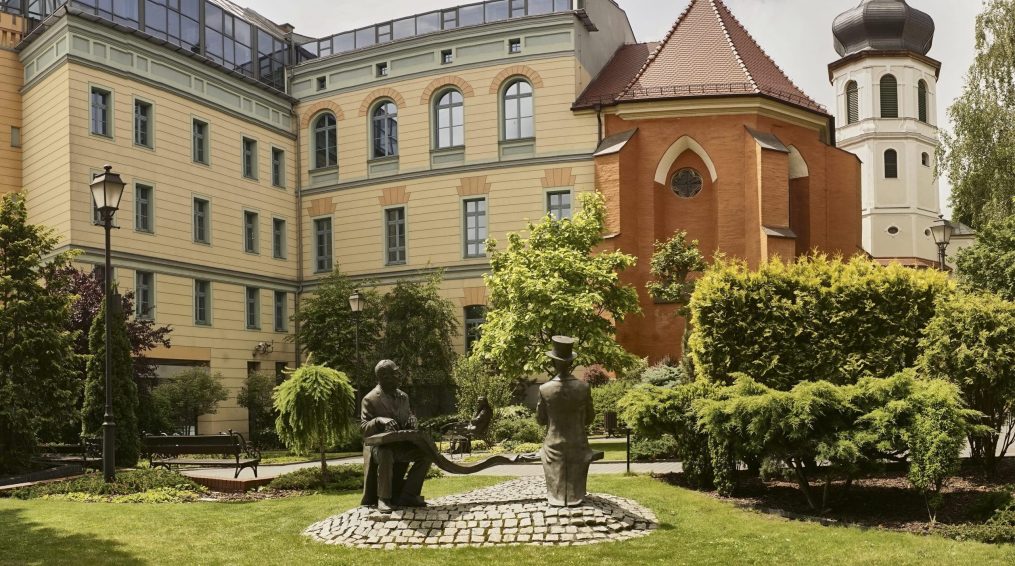
The foundation of the University of Opole in 1994 was the result of the work and intellectual achievements of many generations of inhabitants of Opole Silesia, who wished to have in their native land a scientific and educational institution of the highest rank, which in the European civilisation is a university
The University of Opole draws on the tradition of the establishment of the Piast university in Brzeg in the 16th century by Duke George II of Brieg and in Nysa in the 17th century by Prince Charles of Austria. It also adapts the tradition of the Royal Agricultural Academy (1847-1881) based in Proszków near Opole in the 19th century.
Finally, the University of Opole was formed through the merger of two institutions of higher education in Opole: the 44-year-old Higher School of Education (1950-1994), one of the best pedagogical universities in Poland, and the Opole Branch of the Catholic University of Lublin, existing since 1981, based on several decades of experience of the Higher Theological Seminary in Nysa (where the academic staff of the former Faculty of Theology of the Jan Kazimierz University in Lviv worked).
The history of academic Opole, which is more than half a century old and whose emanation is the University of Opole, was shaped by eminent intellectuals – people who came to Silesia after World War II from distant lands, mainly from the Eastern Borderlands of the Second Polish Republic, lost by Poland after the war. Among them were renowned professors, who sometimes served as rectors and deans here in Opole, e.g. the outstanding linguists Professors Stanisław Rospond (the first rector of the WSP) and Henryk Borek, the distinguished historian of literature Stanisław Kolbuszewski – before the war a professor at the University of Riga in Latvia, the well-known logician born in Charbin in China, Prof. Jerzy Słupecki, the excellent historian-medievalist Prof. Maurycy Horn from Lviv, the eminent historian Władysław Dziewulski born in Moscow, the lawyer and political scientist Prof. Józef Kokot – long-standing director of the Silesian Institute in Opole, the eminent chemist Prof. Barbara Rzeszotarska, the eminent German and English philologist Prof. Marian Adamus, the historian of antiquity Prof. Eugeniusz Konik from Lviv; the well-known Slavist Prof. Stanisław Kochman; the eminent folklorist and long-serving Senator of the Republic of Poland Prof. Dorota Simonides, the sociologist Tadeusz Gospodarek from Lviv; the long-serving Director of the Institute of Chemistry Prof. Maria Nowakowska, and the historian, biographer and Senator of the Republic of Poland Prof. Stanisław Sławomir Nicieja – author of monumental works on Lviv.
The shape of the Opole branch of the Catholic University of Lublin before its incorporation into the structure of the University of Opole was defined by eminent theologians: Rev. Prof. Alfons Nossol – philosopher, ecumenist, doctor honoris causa of eight European universities, Rev. Prof. Helmut Sobeczko – outstanding liturgist, and Rev. Prof. Kazimierz Dola – eminent Church historian.
The establishment of the University of Opole in 1994, which was a great success of the Opole political and intellectual elites and an expression of their consolidation around that beautiful idea, liberated hitherto inhibited ambitions, abilities and possibilities in our region. In a short period of its existence, the young university has impressively changed its material shape, erecting or rebuilding, especially during the three terms of office of Rector Prof. Stanisław Sławomir Nicieja, impressive educational facilities, laboratories, classrooms, specialist libraries, new halls of residence, and revitalising historic buildings at a cost of over 200 million zlotys. Today, the buildings of the Collegium Maius (a former baroque Dominican monastery), Collegium Minus (a former neo-Gothic hospital), Villa Academica (an Art Nouveau building), the buildings of the Colleges of Education and Social Sciences, and the Niechcic Hall of Residence (13 floors) are among the most impressive and functional in the Polish higher education system.
The University of Opole, as a community of students, researchers and administrative staff organising the teaching process, numbering around 20,000 people, had and still has outstanding academics in its ranks, such as professors: Dorota Simonides, Zdzisław Najder, Jan Barcz, Stanisław Gajda, Wiesław Łukaszewski, Wiesław Lesiuk, Stanisław Sławomir Nicieja, Barbara Rzeszotarska, Maria Nowakowska, Krystyna Czaja, Piotr Wieczorek, Józef Musielok, Andrzej Gawdzik, Franciszek Marek, Jan Seredyka, Marian Marek Drozdowski, Leszek Kuberski, Janusz Kroszel, Janusz Słodczyk, Rev. Alfons Nossol, Rev. Kazimierz Dola, Rev. Jan Kopiec and also outstanding artists – Olga Tokarczuk, Tomasz Różycki, Jacek Gutorow, and Marian Molenda.
In its nearly thirty-year history, the University of Opole has awarded honorary doctorates to distinguished scholars and intellectuals, inter alia, Pope John Paul II, Władysław Bartoszewski, Michał Głowiński, Adam Hanuszkiewicz, Jerzy Janicki, President of Poland Ryszard Kaczorowski, Wojciech Kilar, Kazimierz Kutz, Stanisław Lem, Rev. Archbishop Alfons Nossol, Jan Miodek, Hans-Gert Pöttering, Tadeusz Różewicz, Dorota Simonides, Janusz Tazbir and Wojciech Wrzesiński.
The University the Opole can be regarded as the main creator of the Opole Acropolis – a gallery of restored Baroque and Neo-Gothic sculptures of high artistic merit, and contemporary monuments dedicated to renowned artists whose biographies were linked to Opole.
The UO has been the venue for lectures of prominent Polish and European scholars, artists and intellectuals, inter alia, Leszek Balcerowicz, Jerzy Buzek, Bronislaw Geremek, Alexander Gieysztor, Cardinals Walter Kasper and Joseph Ratzinger, Jaroslaw Panek, Henryk Samsonowicz, and Rev. Józef Tischner. The University also played host to Polish Prime Ministers: Tadeusz Mazowiecki, Józef Oleksy, Jaroslaw Kaczyński, Donald Tusk, and presidents of Poland – Lech Walesa and Ryszard Kaczorowski.
So far, over 100 thousand graduates have left the University of Opole and its predecessor, including distinguished Polish scholars, intellectuals, writers, poets, journalists, reporters, politicians, parliamentarians, and voivodes and thousands of heads of educational institutions. This is the clearest expression of the University of Opole’s rank and social importance.
Stanisław Sławomir Nicieja
Rector of the UO in the years 1996-2002, 2005-2008 and 2012-2016
Rectors of the UO